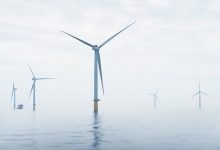French oil and gas super-major Total has set itself a new target of growing its renewable energy capacity to 100GW by 2030, building on the company’s short-term pledge of having developed 35GW by 2025.
Total announced in September 2020 that it was raising its renewable target for 2025 from 25GW to 35GW. At the same time, the company promised plans to add around 10GW of renewable capacity each year following as part of the company’s larger plans of shifting its portfolio away from oil and gas towards electricity.
However, according to energy news site Recharge, Total CEO Patrick Pouyanne has in recent weeks been referring to an ambition for his company of 100GW of renewables by 2030, and a Total spokesperson recently confirmed to Recharge that this is in fact now the company’s official goal.
Referencing an unnamed French business magazine, Recharge also quoted Pouyanne as saying that “for a company like Total to shift 15% of its portfolio to electricity, or nearly 100GW, by 2030, we will have to finance more than $60 billion worth of projects over a period of ten years.”
Worth noting, however, is that Total is already well on its way to achieving these impressive targets. In 2020 alone Total added 10GW of renewables to its portfolio, according to the company’s fourth quarter and full-year 2020 results.
The same results showed that Total now has a portfolio of renewable capacity worth 35GW either installed or in various stages of development – with more than 20GW of this capacity already benefiting from long-term Power Purchase Agreements (PPAs).
This includes the recent acquisition of a 20% minority interest in Adani Green Energy signed mid-January 2021, which itself was an expansion of a February 2020 agreement which saw Total acquire a 50% stake in 2.35GW worth of Indian solar assets.
In addition to traditional renewable technologies like solar PV, onshore and offshore wind, Total in 2020 also invested in two big name floating offshore wind projects.
Firstly, in March 2020, Total acquired an 80% stake in the 96MW Erebus floating offshore wind, being built by Irish ocean resources company Simply Blue Energy and projected to be built off the coast of Wales in the Celtic Sea, marking its first investment in the offshore wind sector.
This was followed up in September by Total’s decision to partner with Macquarie’s Green Investment Group in a 50/50 partnership to develop a portfolio of five large floating offshore wind projects in South Korea with a combined capacity of more than 2GW.
Of course, Total is not committed enough to drag its feet out of all fossil fuel sources, with Pouyanne recently explaining that his company believes natural “will be the fossil fuel, compared to oil and to coal, which will have the largest share in the energy mix in 2040, 2050.”
In the admittedly small field of oil and gas supermajors, Total will be competing primarily with British oil and gas giant BP, which has already committed to reaching net zero emissions by 2050 and in August 2020 pledged to build out a 50GW renewable generating capacity by 2030.
BP was another of the big winners in the UK’s most recent offshore leasing round, walking away with leases for two 1.5GW offshore wind farms with its consortium partner, German utility EnBW, one to be built off the Northern Welsh Coast and a second to be built off the coast of Barrow-In-Furness, off the west coast of England.










